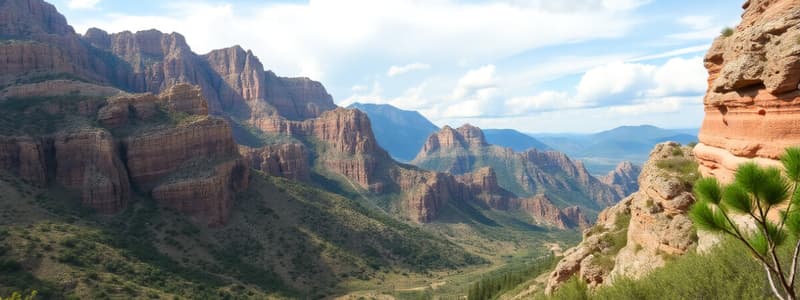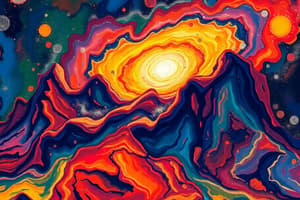Podcast
Questions and Answers
Which type of plate boundary is characterized by spreading?
Which type of plate boundary is characterized by spreading?
- Transform boundary
- Subduction zone
- Divergent boundary (correct)
- Convergent boundary
What primarily composes the Earth's core?
What primarily composes the Earth's core?
- Aluminum and copper
- Oxygen and silicon
- Calcium and magnesium
- Iron and nickel (correct)
Which geological hazard is caused by the movement of tectonic plates?
Which geological hazard is caused by the movement of tectonic plates?
- Tsunamis
- Floods
- Landslides
- Earthquakes (correct)
What is a key characteristic used to identify minerals?
What is a key characteristic used to identify minerals?
What do fossils provide evidence of?
What do fossils provide evidence of?
What type of geological formations can natural resources be derived from?
What type of geological formations can natural resources be derived from?
Which layer of the Earth is primarily solid?
Which layer of the Earth is primarily solid?
What are common processes associated with geological hazards?
What are common processes associated with geological hazards?
What does the study of Geophysics primarily focus on?
What does the study of Geophysics primarily focus on?
Which branch of geology is concerned with the occurrence, distribution, and movement of groundwater?
Which branch of geology is concerned with the occurrence, distribution, and movement of groundwater?
What is the correct sequence in which sedimentary rocks form?
What is the correct sequence in which sedimentary rocks form?
Which branch studies the texture, structure, and origin of rocks?
Which branch studies the texture, structure, and origin of rocks?
What type of rock forms from the cooling and solidification of magma or lava?
What type of rock forms from the cooling and solidification of magma or lava?
How does the rock cycle primarily operate?
How does the rock cycle primarily operate?
What is the main focus of Structural Geology?
What is the main focus of Structural Geology?
Which of these branches primarily investigates the chemical composition of the Earth?
Which of these branches primarily investigates the chemical composition of the Earth?
Flashcards
What is Geology?
What is Geology?
The science that studies the Earth, its composition, structure, processes, and history.
What is Geophysics?
What is Geophysics?
The branch of geology that studies the physical properties of the Earth, including earthquakes and the internal structure.
What is Geochemistry?
What is Geochemistry?
The study of chemical composition of the Earth and its materials, including the origin of rocks and minerals.
What is Petrology?
What is Petrology?
Signup and view all the flashcards
What is Mineralogy?
What is Mineralogy?
Signup and view all the flashcards
What is Sedimentology?
What is Sedimentology?
Signup and view all the flashcards
What is Stratigraphy?
What is Stratigraphy?
Signup and view all the flashcards
What is the Rock Cycle?
What is the Rock Cycle?
Signup and view all the flashcards
What are tectonic plates?
What are tectonic plates?
Signup and view all the flashcards
What are plate boundaries?
What are plate boundaries?
Signup and view all the flashcards
What is a divergent plate boundary?
What is a divergent plate boundary?
Signup and view all the flashcards
What is a convergent plate boundary?
What is a convergent plate boundary?
Signup and view all the flashcards
What is a transform plate boundary?
What is a transform plate boundary?
Signup and view all the flashcards
What are minerals?
What are minerals?
Signup and view all the flashcards
What are fossils?
What are fossils?
Signup and view all the flashcards
What are geological resources?
What are geological resources?
Signup and view all the flashcards
Study Notes
Introduction to Geology
- Geology studies the Earth's composition, structure, processes, and history.
- It includes rocks, minerals, fossils, and Earth's internal and external processes.
- Geologists use fieldwork, lab analysis, and remote sensing.
- Geology's importance is in understanding resources, hazards, and life evolution.
Branches of Geology
- Geophysics: Studies Earth's physical properties using methods like seismology to understand earthquakes and the Earth's interior.
- Geochemistry: Examines Earth's chemical composition to understand the origins and evolution of rocks, minerals, and water.
- Petrology: Investigates rock formation, transformation, and changes over time, concerning their origin, composition, texture, and structure.
- Mineralogy: Focuses on mineral properties, formation, and classification. Understanding minerals is key to understanding rocks.
- Sedimentology: Studies sediment transport, deposition, and lithification.
- Stratigraphy: Analyses rock layers' order and relative ages for understanding Earth's history.
- Structural Geology: Studies rock arrangement and deformations (faults, folds, fractures) to understand geological hazards.
- Paleontology: Studies fossils and extinct life forms to understand past ecosystems and environments.
- Hydrogeology: Focuses on groundwater occurrence, distribution, and movement.
- Engineering Geology: Applies geological principles to engineering projects (dams, tunnels).
Rock Cycle
- The rock cycle involves transitions between igneous, sedimentary, and metamorphic rocks.
- Igneous rocks form from cooling magma or lava.
- Sedimentary rocks come from accumulated and cemented sediment.
- Metamorphic rocks result from transformed existing rocks via heat and pressure.
- The rock cycle is continuous, driven by plate tectonics, weathering, and erosion.
Plate Tectonics
- Plate tectonics explains the movement of Earth's lithosphere sections (plates), which float on a semi-molten layer.
- Plate boundaries are zones of active geological processes (earthquakes, volcanic eruptions).
- Plate boundaries include divergent (spreading), convergent (collision), and transform (sliding) types, creating geological features.
Geological Hazards
- Geological hazards pose risks to human life and property.
- Examples include earthquakes, volcanic eruptions, landslides, floods, and tsunamis.
- Understanding geological processes is critical to assessing risks and mitigating them.
Earth's Interior
- The Earth has concentric layers: crust, mantle, outer core, and inner core.
- The crust is the outermost solid layer.
- The mantle is a semi-molten rock layer.
- The core, composed mostly of iron and nickel, has an outer liquid and inner solid part.
- The interior structure influences geological activities.
Minerals
- Minerals are naturally occurring, inorganic solids with specific chemical compositions and crystal structures.
- Minerals have distinctive physical properties (hardness, color, cleavage).
- Mineral identification involves testing properties and using diagnostic characteristics.
- Minerals are essential rock components.
Fossils
- Fossils are preserved remains or traces of ancient organisms.
- Fossils reveal past life forms and environmental conditions.
- Fossils help date rocks and determine the relative ages of layers.
- Preservation methods (permineralization, molds, casts) yield various fossil types.
Resources
- Natural resources (minerals, fossil fuels, groundwater) come from geological formations.
- Resource extraction impacts the environment and society significantly.
- Understanding geological formations is vital for effective resource exploration and extraction.
Studying That Suits You
Use AI to generate personalized quizzes and flashcards to suit your learning preferences.




